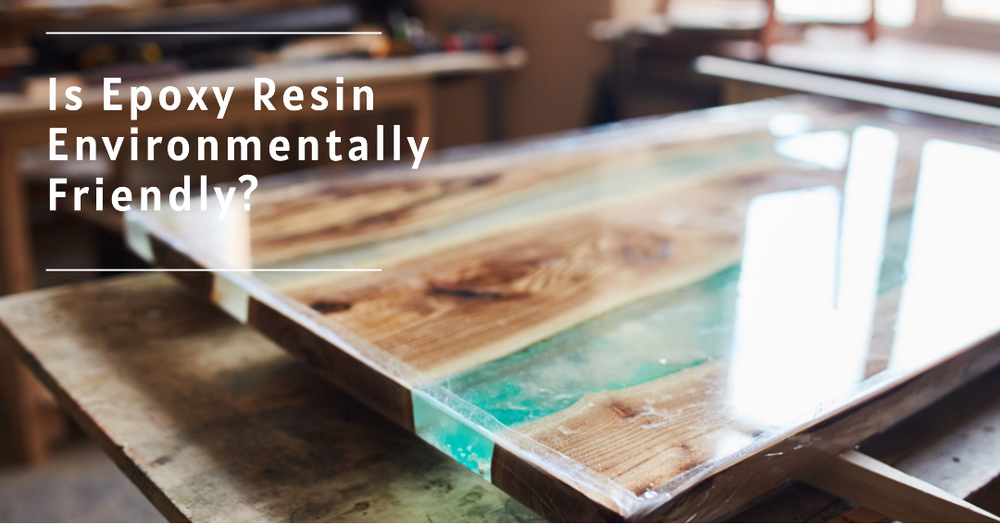Are you curious about the environmental impact of resin? With growing awareness around sustainability, many people like you are questioning the eco-friendliness of the materials they use daily.
Resin is a popular choice for everything from art projects to industrial applications, but its environmental footprint is often overlooked. Imagine being able to make informed decisions that align with your values and contribute to a healthier planet. This article will delve into the complexities of resin, exploring whether it truly is eco-friendly or if there are greener alternatives you should consider.
Stay with us as we uncover the truth behind resin and its impact on your world.
What Is Resin?
Resin is a versatile substance used in various industries. It starts as a liquid and becomes solid through a curing process. Resin can create strong, durable materials. Its applications range from art to construction. Resin offers unique properties like transparency and resistance.
Types Of Resin
Resin comes in different types, each with specific uses. Epoxy resinis popular for art and crafts. It provides a glossy finish and is easy to work with. Polyester resinis used in boat building and automotive parts. It is affordable and strong. Polyurethane resinis flexible and used for molds and coatings. Natural resincomes from plants and is eco-friendly. It is used in traditional medicine and varnishes.
Common Uses
Resin has many uses in everyday life. It is used in making jewelry and sculptures. Its clarity enhances the beauty of the final product. In construction, resin strengthens and protects surfaces. It creates waterproof barriers. Resin is also used in electronics. It insulates and protects components from damage. In the automotive industry, resin helps in making lightweight parts. This improves fuel efficiency.
Environmental Impact
Resin has gained popularity for crafting and industrial uses. Its environmental impact is a growing concern. Understanding how resin affects the environment is crucial. This includes its production and the potential toxicity.
Production Process
Resin production involves synthetic materials. Fossil fuels are often used in the process. This leads to carbon emissions. Factories may not use sustainable practices. Energy consumption is high during production. Transporting raw materials also affects the environment. Not all resin is made equally. Some types use more eco-friendly methods.
Toxicity Concerns
Resin can emit harmful chemicals. These chemicals include volatile organic compounds (VOCs). VOCs can harm air quality. Workers may face health risks in manufacturing. Improper disposal poses environmental hazards. Toxic substances can seep into soil and water. Choosing non-toxic resin can reduce risks. Awareness of these issues is essential for safety.
Biodegradable Alternatives
Resin has gained popularity for its versatility and durability. Yet, its environmental impact raises concerns. Traditional resins often contain harmful chemicals. These chemicals can pollute ecosystems and harm wildlife. Biodegradable alternatives offer a promising solution. They reduce waste and pollution. They also support sustainable practices. Let’s explore plant-based resins and innovations in resin technology.
Plant-based Resins
Plant-based resins use natural ingredients. They come from renewable sources like corn or soybeans. These resins break down more easily in nature. They leave less toxic residue behind. This makes them an eco-friendly choice. They offer similar durability and flexibility. Yet, they have a smaller carbon footprint. Many companies now invest in plant-based options.
Innovations In Resin Technology
Resin technology continues to evolve rapidly. Researchers develop new formulas to improve biodegradability. They focus on reducing harmful emissions during production. These innovations aim to make resin safer for the planet. Some resins now incorporate recycled materials. Others use advanced methods to speed up decomposition. These changes help reduce environmental impact. The future of resin looks greener with ongoing advancements.

Credit: www.ksresin.com
Comparing Resin To Other Materials
Resin has been gaining popularity for its versatility and aesthetic appeal, but how does it stack up against other materials in terms of eco-friendliness? Understanding the environmental impact of different materials can guide your choices and help you make more sustainable decisions. Let’s explore how resin compares to plastic and wood.
Plastic Vs. Resin
When you think about the environmental issues surrounding materials, plastic often comes to mind. It’s notorious for its long decomposition time and impact on oceans and wildlife. Resin, on the other hand, is considered more eco-friendly, especially if it’s plant-based or biodegradable.
Plastic is derived from petroleum, contributing to fossil fuel consumption. Resin, particularly bio-resin, can be made from plant materials. This reduces dependence on non-renewable resources.
Imagine holding a piece of art made from resin and realizing it has a smaller carbon footprint than a similar piece made from plastic. Wouldn’t that make you feel better about your purchase?
Wood Vs. Resin
Wood is often praised for its natural appearance and renewability. However, it requires deforestation, which impacts biodiversity and carbon sequestration. Resin offers an alternative without cutting down trees.
Resin can mimic wood’s aesthetic, providing similar warmth and texture without the environmental cost. You can enjoy the look of wood while knowing you didn’t contribute to deforestation.
Consider a beautifully crafted resin tabletop. It offers durability and style without the ecological impact of traditional wood furniture. Wouldn’t you prefer that for your home?
By comparing resin to other materials, you can make informed choices about sustainability. Which material aligns best with your eco-friendly values?
Reducing Resin’s Carbon Footprint
Exploring the eco-friendliness of resin focuses on reducing its carbon footprint. Using sustainable materials and production methods can make resin more environmentally friendly. Emphasizing responsible sourcing and recycling contributes to a greener future.
Reducing Resin’s Carbon Footprint In today’s world, being eco-friendly is more than a trend; it’s a necessity. If you’ve ever wondered how to make your use of resin more sustainable, you’re not alone. Reducing the carbon footprint of resin involves practical steps that you can incorporate into your lifestyle, benefiting both the planet and your conscience.
Recycling Options
Recycling resin might sound challenging, but it’s more feasible than you think. Many facilities now accept resin products for recycling, allowing you to give your used items a second life. Check with local recycling centers to see which types they accept and how you can prepare your materials for recycling. You can also get creative at home. Consider reusing resin scraps for new projects. Not only does this minimize waste, but it also opens up new avenues for creativity. Have you ever thought about turning your leftover resin into jewelry or coasters?
Sustainable Practices
Adopting sustainable practices in resin use is key to reducing its carbon footprint. Choose eco-friendly resin alternatives made from bio-based materials. These options are often plant-based and produce fewer emissions during production. Additionally, think about how you manage your projects. Batch your resin work to reduce energy consumption, and always measure carefully to minimize waste. Each small step adds up, making a significant impact on your overall environmental footprint. Have you ever considered setting up a workshop with natural lighting to cut down on electricity use? Simple changes like this can make your crafting more sustainable. What small change can you make today to ensure your resin use is greener tomorrow?
Consumer Choices
When you think about making eco-friendly choices, resin might not be the first material that comes to mind. Yet, as more consumers are becoming aware of the environmental impact of their purchases, the question arises: Is resin eco-friendly? Your choices as a consumer can make a significant difference. Understanding which products support sustainability can guide you towards more environmentally-friendly decisions.
Eco-friendly Brands
Some brands are leading the way with eco-friendly resin options. These companies prioritize sustainability by using bio-based resins or incorporating recycled materials. Look for brands that openly share their production process and material sources. This transparency can help you trust that their products align with your environmental values.
Consider purchasing from brands that are certified by reputable environmental organizations. Certifications can provide assurance that the products meet certain ecological standards. Supporting these brands not only helps the planet but also encourages more companies to adopt sustainable practices.
Guidelines For Responsible Use
How you use resin products can also impact their eco-friendliness. Start by purchasing only what you need to avoid unnecessary waste. Excessive consumption, even of eco-friendly products, can negate their benefits.
Think about the end life of the resin items you buy. Can they be recycled or repurposed? Educating yourself on disposal options can prevent your resin waste from ending up in landfills.
Consider joining or forming community groups focused on recycling or upcycling resin products. Sharing resources and tips with others can amplify your positive impact. Have you ever thought about how your small actions could inspire those around you to make greener choices?
Future Of Eco-friendly Resins
Eco-friendly resins are gaining attention in sustainable materials. Their future looks promising as industries shift towards greener alternatives. With rising environmental awareness, demand for eco-friendly resins is expected to grow.
Research And Development
Scientists are exploring new ways to create sustainable resins. Plant-based materials are a popular focus. Using renewable resources reduces environmental impact. Research aims to improve resin properties like durability and flexibility. New technologies are being developed to make production more efficient. Collaborations between universities and industries drive innovation. As research progresses, eco-friendly resins become more viable.
Potential Market Trends
The market for eco-friendly resins is expanding. Consumers prefer sustainable products. Industries are responding with green alternatives. Automotive and construction sectors see potential in eco-friendly resins. These materials can reduce carbon footprints. Packaging industries are also adopting sustainable resins. As demand grows, more companies are investing in eco-friendly solutions. Market trends indicate a shift towards sustainable practices.

Credit: www.youtube.com

Credit: artisttilldeath.com
Frequently Asked Questions
What Makes Resin Eco-friendly?
Resin is eco-friendly when derived from sustainable sources and biodegradable materials. Plant-based resins, unlike petroleum-based ones, are more sustainable. They decompose faster, reducing environmental impact. Always check for certifications that ensure eco-friendliness.
Is Plant-based Resin Better For The Environment?
Yes, plant-based resin is generally better for the environment. It’s made from renewable resources and decomposes faster. This reduces pollution and carbon footprint. It’s also less toxic compared to petroleum-based resins, making it a safer choice for the environment.
Can Resin Be Recycled?
Most synthetic resins cannot be recycled easily. However, some plant-based resins are designed to be more recyclable. Check the resin type and local recycling guidelines. Innovations are ongoing to improve resin recyclability, which could make it more eco-friendly in the future.
Does Resin Decompose Naturally?
Natural and plant-based resins decompose more easily than synthetic ones. They break down over time, especially under the right conditions. Synthetic resins, however, can take hundreds of years to decompose. Choosing biodegradable resins can help reduce long-term environmental impact.
Conclusion
Resin’s eco-friendliness depends on its type and production process. Plant-based resins offer a more sustainable choice. Traditional resins can harm the environment. Opt for biodegradable options when possible. Research and choose wisely to reduce your carbon footprint. Recycling resin products helps minimize waste.
Understanding resin types aids in making eco-friendly decisions. Small changes can make a big impact. Consider both the environment and the product’s lifecycle. Make informed choices for a greener future. Your actions today shape tomorrow’s world. Sustainable living starts with mindful decisions.
Choose wisely for a healthier planet.
